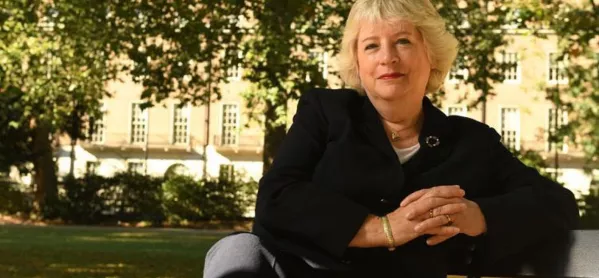Exclusive: Fears teachers will be ‘vilified’ over GCSEs

Education secretary Gavin Williamson may have pledged to “trust teachers, not algorithms” this year, but the final plans for GCSE and A-level grading announced today have not allayed teachers’ concerns, according to one schools’ leader.
Dame Alison Peacock, chief executive of the Chartered College of Teaching, has warned that the profession risks being “vilified” over the plans.
She was speaking after the government announced that GCSE and A-level grades would be awarded through teacher assessment in 2021, with teachers able to use optional papers provided by exam boards as a basis for their judgements.
GCSEs 2021: ‘Excessive grade inflation’ warning
Announcement: Teacher-assessed grades get green light
News: Teachers relieved of appeals burden
Speaking to Tes, Dame Alison said the plans meant teachers were being “placed in an impossible position”.
GCSEs and A levels 2021: Teachers ‘in an impossible position’
“Teachers effectively are being given the mantra that they’re being trusted, but the reality is that they’re being placed in an impossible position this late on in the year,” she said.
“Their chances of being able to use robust assessment that works across regions, let alone across the whole country, are almost zero.”
She said she feared that any public fallout from another grading fiasco - as happened in 2020 - would be used as an excuse to dismiss other forms of teacher assessment in the future.
“We’re walking into something where the government can subsequently say, ‘We can’t really trust teachers - look what happened in 2021.’ It puts in the box any kind of discussion around what could we do beyond those traditional exams we sit in an exam hall.”
She added that teachers would work as hard as possible to assess their students and build up a portfolio of evidence to support their grades, but that they “can’t reliably phone someone at the other end of the country and know that their grade 9 is the same as somebody else’s grade 9”.
“Essentially we’re placing the whole burden of last year’s fiasco on an unsuspecting workforce who are being told, ‘It’s OK, we trust you,’” she said.
“And I just feel worried. My job is to speak up on behalf of the profession and help them respond in the best possible way, and they’re kind of trying to do this with their hands tied behind their back.”
Dame Alison said “Number 10 are very keen not to have another public outcry against them” and that “there is the risk that there will be a public outcry, but it will be against the very people who’ve been doing their absolute best to support their youngsters”.
She said there could have been more leadership from Ofqual and the Department for Education to set up “robust” points during the academic year to check on students’ progress, and that the Chartered College had written to the government offering help with this at the beginning of the school year.
And she added that the grades could not be “comparable” across the country because of differential learning loss, but that with no norm referencing or criterion referencing used, it created a “Wild West” of assessment where grades became meaningless.
“It’s an intractable problem [learning loss], but to put an intractable problem in the hands of individual teachers feels disingenuous at best - it’s all to do with deflecting blame,” Dame Alison said.
She added that teachers would be blamed for grade inflation, but that there would, of course, be inflation in a system where individual grades were submitted, rather than a national system using norm referencing - where a third of students do not pass English and maths GCSEs every year.
“There’s always been an algorithm if you’re a borderline student - some years you get through, sometimes you don’t. That nasty algorithm has been there for a long time.”
She added: “There’s a risk associated with [the plans], and I want to speak up on behalf of teachers who have worked so hard, and continue to work so hard, and yet....they risk being vilified and told they overinflated everything for their own ends, to make themselves look good.
“There’s not a teacher in the land who wants to do that. They want to do the best they can for their students, but they need to be enabled to do so.”
Register with Tes and you can read two free articles every month plus you'll have access to our range of award-winning newsletters.
Keep reading with our special offer!
You’ve reached your limit of free articles this month.
- Unlimited access to all Tes magazine content
- Save your favourite articles and gift them to your colleagues
- Exclusive subscriber-only stories
- Over 200,000 archived articles
- Unlimited access to all Tes magazine content
- Save your favourite articles and gift them to your colleagues
- Exclusive subscriber-only stories
- Over 200,000 archived articles
topics in this article



